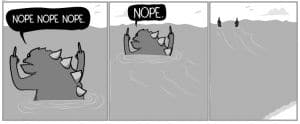by Keidra Chaney
Apologies to those who saw the broken link-filled version of this on Saturday night. It wasn’t supposed to go up yet!

A couple of weeks ago, NPR posted an essay about a music fan that was so annoyed and fatigued by the U2 free album “gift” on their iPod, that they concluded that they were burned out on music and were ready to give up on it completely:
“… do you ever get sick of music? Not like a specific album, but all music. I think it was the U2 album on iTunes that did it for me: Not only do I not care about this album, but I feel like I don’t care about any album. Could this be permanent? I want to like music!”
I had a similar situation occur this past week but instead of U2 it was Alessandra Stanley, and her “Angry Black Woman” feature on Shonda Rhimes in the New York Times. And instead of music, it was pop culture writing.
In full disclosure, I have a long history of hate-reading Alessandra Stanley. From the time she called Everybody Loves Raymond “All About Raymond” to the egregious mangling of Walter Cronkite’s entire career, I have been following her misfires for years.
So naturally, I thought Stanley’s piece was terrible. Rambling, factually inaccurate, pointlessly provocative, stunningly ignorant in its analysis of race and gender and backhanded its “praise” of Viola Davis. I’m not sure what annoyed me more: Stanley’s original post of lazy criticism, or the fact that quite a few of the responses to Stanley actually did a better job of tackling legitimate criticism of Shonda Rhimes than Stanley did. Not that it mattered, their work was written off as reactionary or uninformed.
But mostly, the piece made me lose confidence in pop culture critical writing. If the so-called “Paper of Record” can do this so terribly wrong – where the hell can any writer expect to go to do it right?
Stuffed from a daily diet of cynical pop culture think pieces via social media, pop culture criticism has gone from meta to Inception to the Human Centipede. It just feels like a constant, mind-numbing cycle of consumption and response to the point where writers are not even paying attention, really, just waiting for a new hook to spew “provocative” prose.
There’s only so many different ways you can ask if Beyonce is a feminist or not or if Macklemore killed hip-hop and what does it all mean. And it’s not that these aren’t questions worth asking and exploring but there’s no time to digest, research, discuss. Pop culture criticism is at its best with a sense of larger context: some distance, some time, some immersion. But an hourly, click-obsessed, TMZ-fueled online entertainment news cycle makes that really hard to do.
So yeah, I just hit the point where online pop culture writing immediately shuts my brain down, much like watching an episode of Sherlock Holmes in the 22nd Century. This sucks for me, because pop culture criticism is my bae. So because I enjoy it so much, I’m taking a break. I’m reading some books. Avoiding day-after award show think pieces. Reading some classic stuff from people like Stuart Hall or Pauline Kael. I’m really interested in breaking the cycle of consuming and regurgitating and enjoying a long, thoughtful piece of writing for what it is. It’s actually pretty similar to the advice that NPR’s Stephen Thompson gave to the reader that was ready to give up on music.
… but remaining notionally open to new ideas and art is a hallmark of an active, vigorous mind. Remaining open to enjoyment is a path to, well, enjoyment.
Imma go enjoy some pop culture writing. I’ll tell you how it goes.

